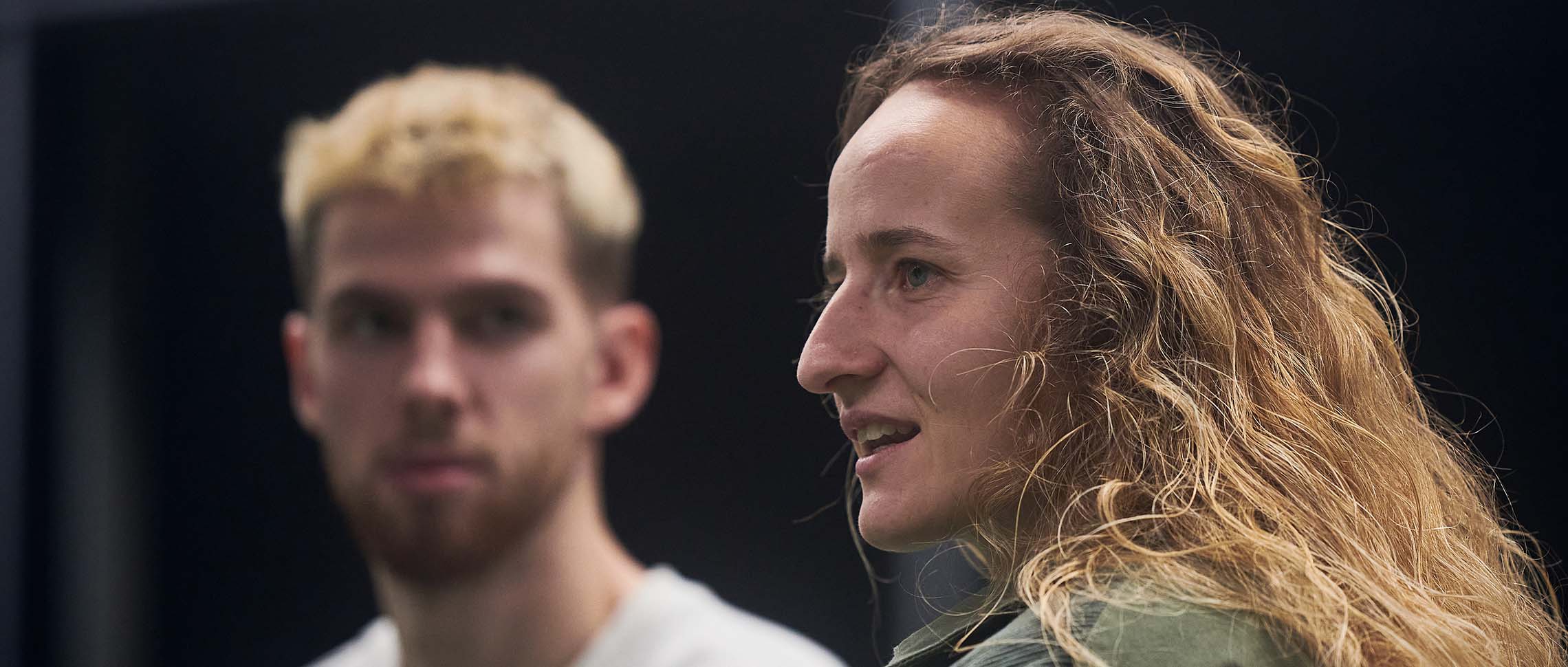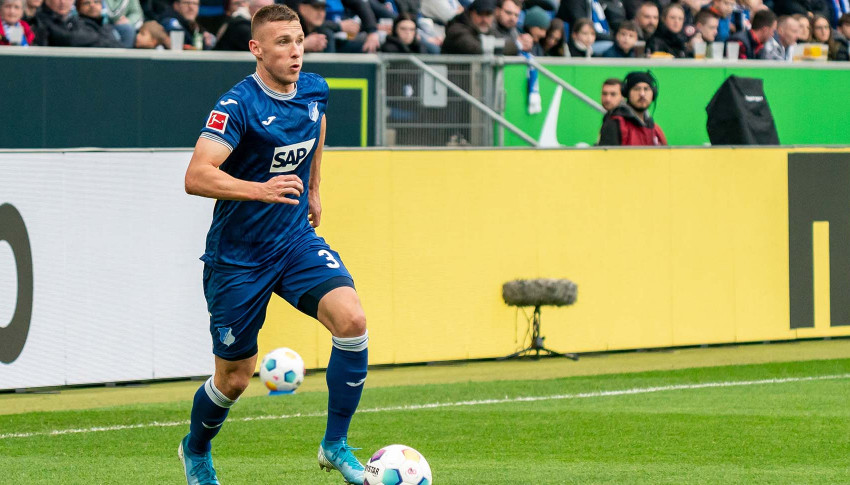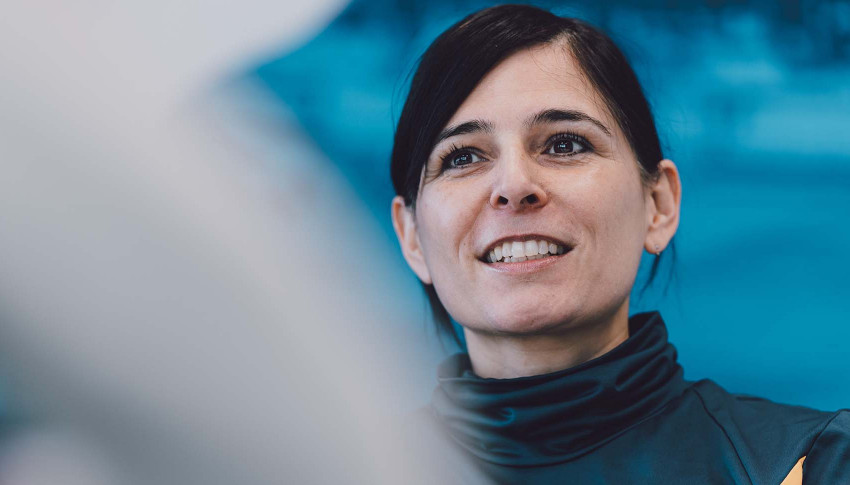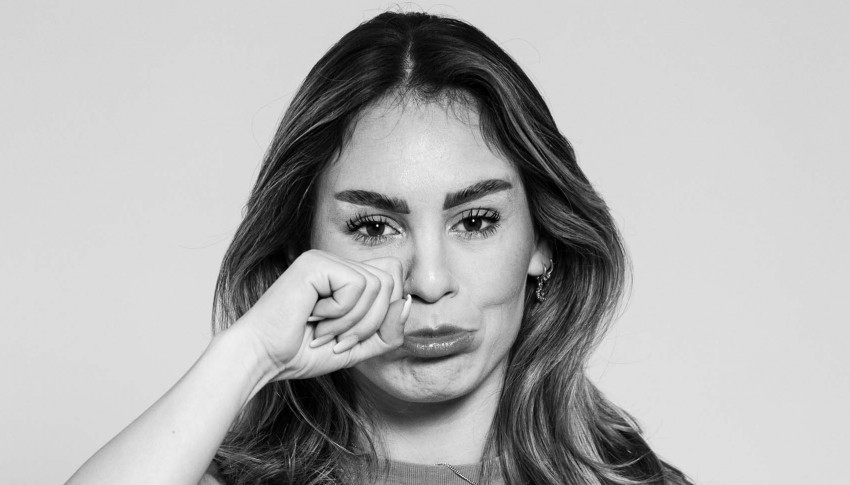"We don't want any handouts"
Fabienne, Anton: A very mundane question to begin with. What did you have for lunch today?
DONGUS: "We ate pasta with Brussel sprout parmesan sauce and salad at our training ground. Our kind soul, Sabine, prepared it for us."
Is that a matter of course?
DONGUS: "It's part and parcel of it now. We really appreciate it. But she only cooks for us and the second team – and has only been doing so for a short time too. It was twice a week last season, but fortunately it's daily now."
What about you, Anton?
STACH: "We also have a cook who prepares food for us every day. We just had piccata with parmesan, almonds and egg. I think it's outstanding that we get food every day. It's such a relief for us, especially because the food is healthy and tailored for us athletes. I really appreciate it, as it hasn't been a given in my career so far."
DONGUS: "Can you cook?"
STACH: "Yes, at least I try. It's like football – there's always room for improvement." (laughs)
What do you think the everyday life of a TSG women's player is like?
STACH: "I think the women's players also live very professionally. The amount of training is certainly similar to ours. And probably the times too..."
DONGUS: "...by now they are."
Fabi, how many are there in your group who have studied or are still studying?
DONGUS: "Things have already become highly professional for us in the more recent past. In terms of professionalism, we're now in the upper third in the Bundesliga. When I moved to TSG, for example, I was completing a joint honours degree. But by this point, we can all concentrate to a large degree on football – because we're now getting paid a certain amount too."
Anton, your sisters are international players in basketball. Is that the case for them too?
STACH: "The younger one, Lotta, is still studying in parallel. My older sister Emma has also completed further training and studied alongside sport; she went to college in the USA and completed her bachelor's degree in psychology. Both have a professional focus on sport, but are also doing important things for their future careers in parallel."
How are your performances perceived within the family? You said in a SPIELFELD interview that you were the only child in the family without an international cap for a long time...
STACH: "I still have the fewest international caps by some distance. (laughs) I frequently get teased about that at home. But the acknowledgement of their performances and the lack of public presence is a big topic. Nobody at home understands the fact that a Women's Basketball European Championship is only broadcast somewhere on the Internet, if at all. I can totally understand my sisters' anger; to a certain degree, it also shows the lack of respect for their performances. But they still deal with it very well, continue to do their thing and never doubt their passion. But the public reach is lacking – and that's a shame. That's why I think it's good that something is happening with women's footballers. Maybe it can also open doors for women's sport in general."
Do you think that football can learn something from other sports? In tennis or volleyball, men and women are significantly closer to each other in terms of marketing; sometimes, there is the same prize money...
DONGUS: "We often talk in the dressing room about how happy we are to be footballers. As far as team sports are concerned, we've already managed to achieve popularity. In tennis, it's more the case that you have to be one of the few to reach the top in order to make a living from it. That's why we realise that we are privileged and appreciate that. Now the conditions need to be further improved, the league needs to be bolstered in the medium term and minimum wages need to be determined. That's a great development. The problem is that there are always disparaging comparisons with the men's game, for example. Of course, the play is slower and different; you simply can't compare it like-for-like."
There are successful mixed competitions in the biathlon and in tennis. Would something like this be a way to raise awareness?
STACH: "Why not? I think it would at least be an interesting approach. There are of course natural, genetically determined differences in terms of physicality and speed. But on the other hand, there would certainly be a huge cheer if a woman were to nutmeg a man, for example, and thus get the better of him. Personally, I can definitely see this happening and I believe that special events like this could also bring many more fans into contact with women's footballers."
DONGUS: "I've often played against boys before, at club level too. So I think a mixed game like that would be really fun. (laughs) It has a lot of potential, it would be exciting. A cool event, you would combine women's and men's football and it could finally be seen as a common sport as well. Of course, women are physically inferior. But maybe you could add a few special rules. I'd be there in a heartbeat."
What do the TSG women still lack in terms of facilities compared to the men?
DONGUS: "I believe that the structures in Zuzenhausen are significantly better, much more professional. Everything is bigger here. I'm not complaining at all, but the infrastructures cannot be compared to each other. We have our own training ground. But the gym is very small, as is our kitchen. For example, we cannot all eat together; there's no canteen. And in terms of regeneration facilities, there are major differences. You have a sauna and all these things."
STACH: "We already have a great deal at our training centre, the conditions are ideal."
DONGUS: "That said, I don't think we should always harp on about what's missing. Rather, we should be happy that there has been and continues to be a huge development. What's really missing are the spectators and the attention."
But are the attention and the media pressure that the men are subjected to perhaps things that you secretly don't miss so much?
DONGUS: "I'm quite happy about the fact that we can do our own thing. That we don't have this media pressure. But it's already increasing. You now hear more and more often that women's players have to go out of their way to avoid it. I don't have that many problems with it, but I don't want to know what it's like to be in the public eye like that and not be getting the right results. I think you must hear a lot about it."
STACH: "Definitely, from all sides. The public pressure can be immense."
Is that something that you would happily do without?
STACH: "It's difficult to say. I grew up dealing with criticism. My father Matthias comes from the same background as a sports journalist and a former competitive sportsman, so I became acquainted with this topic as a child. It is therefore actually okay for me, I can deal with criticism well. But I'm sure that it can also lead to a lot of psychological problems – regardless of gender. I also know a few players who have developed mental problems. Everyone deals with it differently when you play badly, lose often or are out of form. But of course there are also positive aspects to this; for examplem when someone comes up to you after the game and says: 'Wow, you played well.' That can be very uplifting in certain phases. But above all, I don't think you should focus too much on social networks."
The topic of equal pay plays a role in the public discourse time and time again in this context. How do you see it?
DONGUS: "Personally, I think there's too much money in football in general. That's the biggest problem, as it's a sport that almost everyone in our country likes to watch or play. Earnings are loosely linked to attention and visibility. And accordingly, I would never demand that we should get the same salaries. Where would the money come from? You have to think economically. What's more, the men sometimes have so many games, plus all the background noise – I wouldn't want to swap places with them. I think you're sometimes just a number in the Men's Bundesliga. If you get injured, the next player comes on. That's why it's perfectly okay that they earn more. But the differences are certainly a bit too stark and the sums in the Men's Bundesliga aren't healthy either."
STACH: "You're saying a lot of true things. The figures in this business are generally very high – also in view of what other people earn in other professions. Nonetheless, I believe that there's often a completely incorrect picture of the professional life. There are a lot of players who are ruined by the media pressure, their private life is barely existent or even completely destroyed – these aspects are also part of the truth and should be taken into account in these discussions. We're undoubtedly privileged as professional footballers. But some also see part of their wages as a kind of compensation for their suffering."
From an industry perspective, would it be conceivable for the men to pay a kind of solidarity bonus to the women? 1% of their salaries to their Women's Bundesliga colleagues, for example...
STACH: "It's an interesting idea that would certainly make a big difference and would also send a strong message to the outside world."
DONGUS: "As it's money generated by football, I think it would be okay. In general, though, we don't want handouts; we want to continue to grow, have more spectators and justify higher salaries. But that development takes time. That said, I would take 1% from the men." (laughs)
There is definitely an inequality between the genders when it comes to family planning and all the associated topics – as there is when it comes to the female cycle. Fabi, what role does it play for you in football?
DONGUS: "We're a relatively open group, many of us have known each other for a very long time. And of course we also talk about the menstrual cycle or the pill, which can also have an impact on the psyche and physical condition."
These topics have recently been discussed more publicly too – an effect of the growing coverage of women's footballers. Have you noticed that the openness towards this topic has changed?
DONGUS: "Nobody really cared in the past; you were left to deal with it alone. Nowadays, the club has an app where you enter your health data every day; your cycle also plays a role and you're adjusted to it in the best-possible way."
STACH: "For purely genetic reasons, we don't have these hormonal factors, of course, which definitely make it much more challenging for women."
To what extent does it affect your training?
DONGUS: "Sometimes you feel really awful when you're on your period. Your hormones go completely crazy, which isn't easy when you're with so many people or dealing with defeat or disappointment, as you're then exposed to even greater mood swings."
How can this be reconciled with your everyday life as an athlete?
DONGUS: "Well, you take a painkiller first and then you're fine. But if you have bad timing, then you go into training with abdominal pain and cramps. That's really bad, and women are more susceptible to injury during this phase. That's why it's a big problem for us. I had a lot of muscle fibre tears and it was then discovered that I always got them in a certain phase of my cycle. I then did different activations before training and it got better, which is another reason why our app is very helpful. With cruciate ligament ruptures too, women's footballers are often first asked which phase they are in. The topic is omnipresent."
And then there's family planning. Anton, do you believe that there would already be so many fathers in your team if every player had to take a year away from their careers each time they had a child?
STACH: "That is of course difficult to say, but I honestly find it hard to imagine."
DONGUS: "In our squad there are trailblazers such as Melanie Leupold and Almuth Schult, who had a child during their careers and then came back. But it's a tough battle. And I think it's good that we talk about such things because it's also part of the comparison between male and female footballers. I know Almuth a little and she gets emotional about the topic. That's what made me realise what a hard time that was. On the one hand, it was the best feeling in the world to have a child. And on the other hand, she had to fight to keep getting paid and was naturally concerned that she would never get back to her previous performance level. It's difficult for some of us whose dream has always been to start a family early on. It is hard to reconcile that with football, which continues to be our purpose in life. Fortunately, the age limits have shifted a little, but in the past almost all players who wanted to become mothers ended their careers by the age of 30 at the latest – without having financial security, of course. Hardly anyone thinks about having a child at the age of 25 anymore, because you're reaching your peak football age. Your partner also has to take that into consideration; it isn't easy when it comes to family planning."
STACH: "It would definitely be important and desirable to provide players with better support in this regard and to make this decision easier. In the best-case scenario, of course, the salary would be guaranteed by the clubs for the entire time. I have great respect for the fact that women in football have to make this truly difficult decision."
Another topic that is discussed time and time again is homosexuality in football. Lesbian relationships have long since been normal and public in football, but there are officially no gay male professional footballers in Germany. Why do you think that is?
DONGUS: "It's normal for us and nobody is worried about being ostracised or insulted at matches. You can therefore live your life the way you want to. In men's football, it's unfortunately a completely different matter. I can imagine that the media attention and possible behaviour in the dressing room would hold someone back from coming out. The fear of being ostracised is certainly very high and I believe that homosexual male footballers have a hard time of it. Unfortunately."
STACH: "That's precisely what I think. I also believe that many footballers are afraid of being excluded – even though society has become much more open in general. But being the first is a different step entirely – even though the LGBTQ movement has already achieved a lot and there would be a lot of people who would support the player. But it'd still be a very courageous decision to go public about it. And it would of course come with a media presence that would drain energy and also be a distraction from sport. That's why you have to understand the players who don't want to come out at the moment. It's a very personal decision that needs to be respected."
DONGUS: "I can imagine that the first player in the Bundesliga to come out would really be celebrated. But that's not necessarily what everyone aspires to – becoming a symbolic figure. It takes courage and thick skin. And even if you're heterosexual, you want to keep your private life private. It's already a process to admit it to yourself and then to your family. Many people already have enough to contend with. When you're in the spotlight too, it's easy to understand how difficult that must be."
For decades, female coaches in men's football were also a taboo – one which is now slowly crumbling. Can you envisage being coached by a woman, Anton?
STACH: "Of course, why not? If she lives for the sport and does a good job – then certainly. From my point is view, it comes down solely and entirely to quality. It doesn't play any role whether it's a woman or a man."
Do you think that many people share your opinion?
STACH: "I think so. I don't see what argument there could be against it. Once again: ultimately it's performance and success that count."
DONGUS: "But as a woman, I'd say that there would be many men who have this macho ego problem and wouldn't let a woman tell them what to do."
STACH: "That certainly exists in some cases. But for me personally, it would be easy and it works very well at Union Berlin with Marie-Louise Eta as the assistant coach. For many years, my sisters have been good examples of what girls and women can achieve in sport and how well they understand it. Incidentally, I always deliberately listen to their criticism of me after a game. And I haven't had much to argue about so far."“
Fabi, you have already been coached by men and women. Are there any differences?
DONGUS: "I think that Nadine (editor's note: Rolser, going on maternity leave in March) brings an important perspective to us as an assistant coach: a bit of feminine thinking, perhaps more empathy and more delicacy in certain situations. Generally, though, I have to admit that it's good to have male head coaches. (laughs) When something has to be shouted from the touchline, for example, it just hits differently – even if that might sound strange..."
It's all about giving an honest opinion in this discussion...
STACH: Fabi has just described her personal experiences and perceptions. I personally haven't had any contact with a female coach; I've only ever been coached by men. Nonetheless, I stand by what I said before: I would have absolutely no objection to a competent female football coach."
DONGUS: "If I was coached by a woman for a longer period of time, I might have a different opinion, but it was only ever for a very short time. At the moment, I think the combination of male head coach and female assistant coach is perfect for us."
Finally, a forecast: what do you think women's football will look like in 2050?
STACH: "I'm convinced that it will have developed significantly by then, the conditions will be even better and attendance figures will be significantly higher."
DONGUS: "I agree with that. I also believe that there will be higher transfer fees and salaries, but also more things like winter transfers, which aren't really part and parcel of it at the moment. And I'm sure that women and men at the same club will train at the same locations; the training conditions will level up more and more."





















